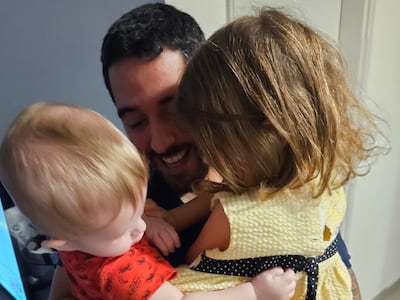I'd like to start with a disclaimer: My husband is great and I am very thankful to have him in my life. But to be repeatedly told I'm “lucky” to have him by other people, when he's not told the same about me, can get a little insulting, to say the least.
It's something I've heard much more since we've had our two children.
“You're so lucky to have a husband who changes nappies,” I've been told. “You're so lucky to have a husband who cooks,” they've said. “You're so lucky to have a husband who loves the children and is patient with them,” was a more recent one.
Is he lucky to have a wife who changes nappies and loves the kids? (I don't cook, so he can have that one.) It feels like we're setting the bar for being a husband and a father extremely low here.
It is still expected that domestic life and motherhood comes naturally to a woman, while men have the choice to opt in or out of the everyday dealings of family goings-on. If I get it wrong, I'm judged; if he gets it wrong, “he's a man”. Let's face it, that's not only demeaning to me, but him too.
Whenever I talk about how involved my husband is with the child rearing – we aim for an equal amount – he's treated like he's father of the year. “That's so great,” people say, when I mention he does baths and bedtime every other day, shooting him a look of admiration that I've never once seen for my involvement in our alternating evening routine.
In the past, when we had only one child, he was working away for long stretches and I was left to do all the parenting alone, for a good portion while pregnant, all while working a full-time job. “That's what happens when you become a mum,” I was told, with an underlying implication that perhaps I should give up work to make it easier on myself, as if I were only working for fun in the first place.
But on the occasions he's needed to take on a bigger share of the responsibility, if I'm unwell, for example, or tied up with work, then I'm back to being “lucky”.

He has confirmed no one's ever told him he's lucky to have me in his life. I'm trying not to take it personally.
Granted, most of the "you're lucky" comments come from older women who grew up in a different generation and who did have to take it fully upon themselves (or sometimes with a nanny) to change nappies, cook, clean, child-rear, shop and so on. But it also comes from people the same age as me and even younger, possibly lamenting the deficiencies in their own partnership.
It's predominantly women who say these things to me, too. Men perhaps don't want to draw attention to how they're not participating – something I'm assuming is the case, since I'm still considered “lucky” and not the norm. Or they're busy boasting to my husband about how little they do (true story).
I'd have hoped we were past this rhetoric in 2024, but it seems as though it's going to take at least a couple more generations before we move past these expectations of what a family unit is or should look like.
Yes, in many cultures men once upon a time all went out to work to earn the money, while women exclusively stayed home to raise the children. But that is no longer the case and has not been for a long time. Some women still choose to be stay-at-home mums, and that's fine. But so do some men, and that's fine too. And most people I know both work in some capacity. The difference is being able to carve up your own priorities based on your individual family's needs, and not leaving it up to “luck” what each of you will or won't do.
So why on earth, when we're both in good health and now working the same amount of hours from home together, should it be considered anything but acceptable that my husband is doing an equal share of the parenting? Let alone the basic, fundamental human emotion of loving his children.
Like I said, I am very appreciative of the things my husband does for us. And I'm glad I have a husband to help, when so many don't. But the fact he participates is not luck. It's choosing a good man and both of us working hard (sometimes very hard!) at our relationship to ensure neither feels overburdened.
Because if he didn't change any nappies, I'd be rethinking our vows, not considering it normal. Although, to be fair, thanks to those keen domestic culinary skills, it would be a tough call.

